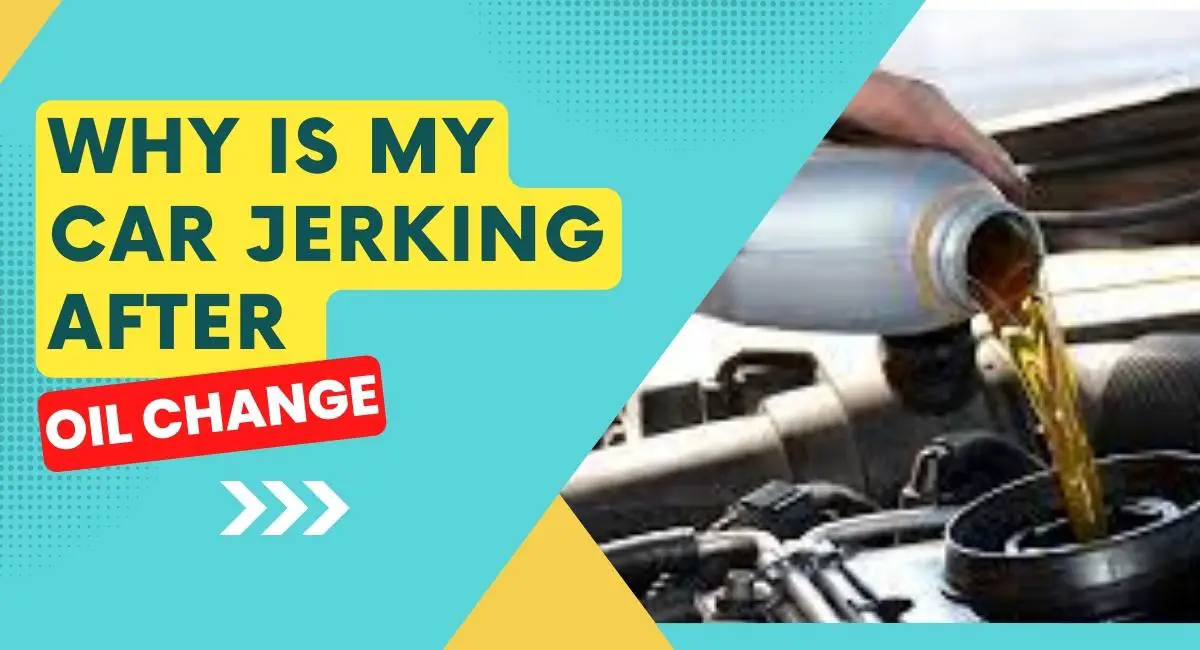Getting an oil change is a routine maintenance task that every car owner should undertake regularly. It ensures the longevity and optimal performance of the vehicle’s engine.
However, many people who own cars have experienced a jerk or delay when their vehicle starts after an oil change. It can be disconcerting, especially if you’re driving down the road and suddenly experience this jerk, causing you to swerve off the road.
A smooth driving experience is crucial for safety and comfort, so addressing this problem is essential. In this article, we will delve into the possible causes behind a car jerking after an oil change and provide insights into how to resolve it.
Possible Causes of Car Jerking after an Oil Change
Although an oil change is crucial for maintaining your car’s health, it can inadvertently lead to problems if not executed properly. Utilizing the incorrect oil type and inadequate or excessive oil levels can result in engine damage and other issues that manifest as jerking sensations in your car.

Wrong Oil Viscosity
The use of incorrect oil viscosity is a possible reason for a car to jerk after an oil change. Each vehicle is designed to operate optimally with a specific type of oil, usually outlined in the owner’s manual. Using oil with the wrong viscosity can interfere with the lubrication system, leading to improper engine performance.
If the oil is too thin, it may not provide adequate protection, causing friction and wear on engine components. On the other hand, if the oil is too thick, it can impede the flow, resulting in poor lubrication. In either case, the inconsistent lubrication can cause the engine to jerk when accelerating.
The solution to Wrong Oil Viscosity
To address this issue, ensure you’re using the recommended oil viscosity for your vehicle. Consult your owner’s manual or contact a trusted mechanic to determine the correct type of oil that matches your car’s specifications. It’s also important to double-check the oil specifications before every oil change to avoid any potential mix-ups.
Air Bubbles in the Oil System
During an oil change, it’s crucial to remove all the old oil and replace it with fresh oil. However, if air bubbles are trapped in the oil system during the process, it can lead to erratic engine performance and jerking sensations. Specific engine designs or an insufficiently particular oil change procedure may increase the likelihood of air bubbles in the oil system.
When air bubbles are present, they can cause momentary oil pressure loss, leading to jerking when you accelerate.
Have the oil system inspected by a mechanic to resolve this issue. They will check for trapped air bubbles and ensure proper bleeding of the oil system. By removing the air bubbles and restoring adequate oil pressure, you can eliminate the jerking problem. Plus, it is possible to prevent air bubbles from getting into your cooling system.
How to Fix Air Bubbles in the Oil System
If you suspect air bubbles are causing the jerking, take your car back to the mechanic who changed the oil. Explain the issue and ask them to ensure proper bleeding of the oil system to remove any trapped air. Conduct a thorough inspection and necessary adjustments to guarantee the smooth operation of your vehicle.
Clogged or Faulty Fuel Injectors
While it may seem unrelated, the jerking issue after an oil change can sometimes be due to clogged or faulty fuel injectors. Fuel injectors play a crucial role in delivering fuel to the engine cylinders. However, if they become dirty or malfunction, they can disrupt the fuel-air mixture, leading to engine misfires and jerking during acceleration.
If the need for an oil change coincides with a decline in fuel injector performance, it may mistakenly lead you to believe that the oil change caused the jerking issue.
A solution to Faulty Fuel Injectors
If you suspect clogged or faulty fuel injectors are causing the jerking, it’s advisable to have them inspected and cleaned by a qualified mechanic. Regular maintenance, such as fuel injector cleaning, can help prevent such issues from occurring in the future.
Loose or Damaged Engine Components
Sometimes, the jerking sensation after an oil change can result from loose or damaged engine components. The vibration caused by the oil change procedure or the removal and reinstallation of engine parts may have resulted in a loosened connection or damage to critical components such as spark plugs, ignition coils, or vacuum hoses. These issues can lead to inconsistent engine performance, resulting in jerking during acceleration.
Solution
If you suspect loose or damaged engine components are causing the jerking, having a professional mechanic thoroughly inspect your car is recommended. They can identify any loose connections or damaged parts and rectify the issue accordingly.
Can an Oil Change Cause a Misfire?
While it’s uncommon, an oil change alone is unlikely to cause a misfire. Issues with the ignition system, fuel system, or engine components typically cause misfires. However, using the wrong oil viscosity or trapped air bubbles is in the oil system during the oil change process. These can be a misfire.
Besides, you must address misfires regardless of whether they coincide with an oil change. If you experience persistent misfires or jerking after an oil change, having your car inspected by a qualified mechanic is recommended. They can diagnose the specific cause of the misfire and perform the necessary repairs or maintenance to restore proper engine function.
Can Needing an Oil Change Cause Your Car to Jerk?
Yes, driving with old, dirty oil can negatively impact your car’s performance and potentially cause jerking during acceleration. When the oil becomes degraded and loses its lubricating properties, it can increase friction and wear on engine components. It can result in inconsistent engine operation and jerking sensations.
What You Should Do When in Need of an Oil Change
Follow the recommended oil change intervals specified in your owner’s manual to prevent issues with an oil change. If you notice jerking or other unusual symptoms in your car, it’s advisable to have your oil changed promptly. If jerking persists after an oil change, it could indicate other underlying issues.
In Summary
Experiencing jerking after an oil change can be concerning, but it’s important not to panic. By understanding the potential causes and implementing the appropriate solutions, you can address the issue and restore smooth driving. Remember to use the correct oil viscosity, ensure proper bleeding of the oil system, maintain clean fuel injectors, and inspect engine components for any damage or looseness. By taking these steps, you’ll enjoy a comfortable and trouble-free driving experience after your oil change.
